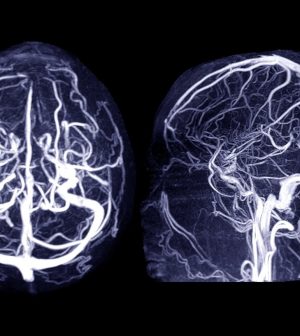- Could Your Grocery Store Meat Be Causing Recurring UTIs?
- Are You Making This Expensive Thermostat Error This Winter?
- Recognizing the Signs of Hypothyroidism
- 10 Strategies to Overcome Insomnia
- Could Artificial Sweeteners Be Aging the Brain Faster?
- Techniques for Soothing Your Nervous System
- Does the Water in Your House Smell Funny? Here’s Why
- Can a Daily Dose of Apple Cider Vinegar Actually Aid Weight Loss?
- 6 Health Beverages That Can Actually Spike Your Blood Sugar
- Treatment Options for Social Anxiety Disorder
Statins, Metformin Can Cut Odds for Brain Aneurysms

Common drugs used to control cholesterol, blood sugar and high blood pressure might also lower a person’s risk of stroke, a new study finds.
The researchers evaluated the risk of brain aneurysms that cause bleeding strokes in patients.
For the study, they looked at the medical records for nearly 4,900 patients who had a bleeding stroke, and compared them against nearly 44,000 people who never had a brain aneurysm.
They identified four specific drugs that appeared to lower the risk of a brain aneurysm, after accounting for other risk factors:
-
The high blood pressure drug lisinopril reduced risk by 37%.
-
The cholesterol drug simvastatin decreased risk by 22%.
-
The diabetes drug metformin lowered risk by 42%.
-
The prostate drug tamsulosin reduced risk by 45%.
“We urgently need new ways to prevent this type of stroke, which occurs at younger ages and with a higher death rate than other types of stroke,” said researcher Jos Peter Kanning, with the University Medical Center Utrecht in the Netherlands.
“Our current surgical treatments for brain aneurysms have a risk of permanent disability and death that often outweighs the potential benefits, so preventing rupture with a noninvasive drug would be very beneficial,” Kanning added in a university news release.
On the other hand, four drugs increased the risk of a bleeding stroke: the blood thinner warfarin, the antidepressant venlafaxine, the antipsychotic prochlorperazine, and the painkiller co-codamol.
The findings, which were published June 5 in the journal Neurology, only show an association between these drugs and stroke risk, the researchers noted.
“Future research is needed to investigate these associations and determine whether these drugs are effective in reducing the risk of hemorrhagic stroke,” Kanning said. “This work could also help us identify additional risk factors for subarachnoid hemorrhage, potentially leading to new therapies to manage aneurysms.”
More information
Johns Hopkins Medicine has more about stroke.
SOURCE: American Academy of Neurology, news release, June 5, 2024
Source: HealthDay
Copyright © 2026 HealthDay. All rights reserved.










